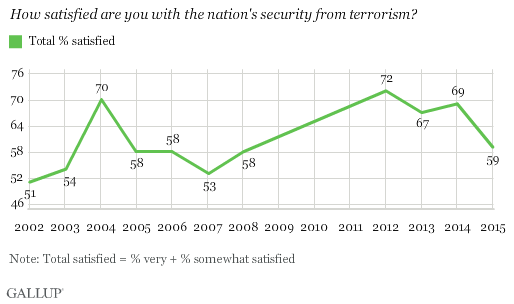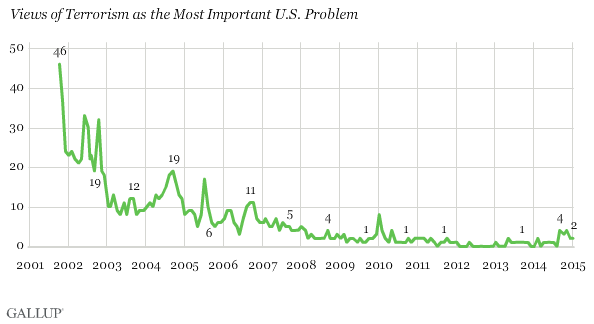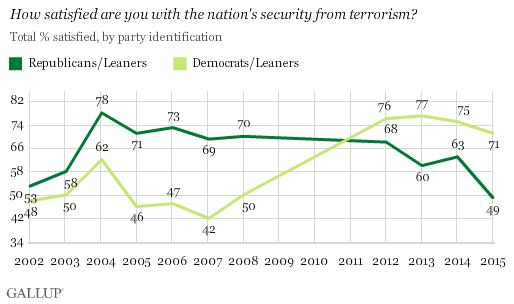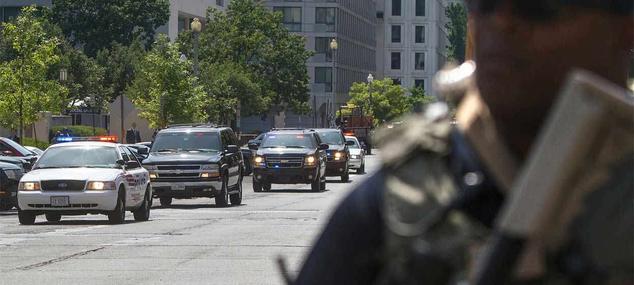Story Highlights
- Satisfaction on security from terrorism down 10 points vs. 2014
- Still, few Americans mention terrorism as nation's top problem
- Democrats are much more positive than Republicans
PRINCETON, N.J. -- Although a majority of Americans remain satisfied with the nation's security from terrorism, this measure has dropped 10 percentage points since last year, from 69% to 59%, and is now back where it was in 2008.

The latest update on Americans' satisfaction with terrorism and other aspects of American life comes from Gallup's Jan. 5-8 Mood of the Nation poll. The interviewing dates for this poll overlapped the Jan. 7 terrorist attack on the headquarters of French newspaper Charlie Hebdo in Paris. Although that attack was not against Americans, it received widespread U.S. media attention, likely making the terrorism issue more salient in Americans' minds.
Satisfaction with the nation's handling of terrorism over the past 13 years has varied from as low as 51% in January 2002 -- months after the 9/11 terrorist attacks -- to the high point of 72% in January 2012. The measure was at 70% in January 2004, just a few weeks after the Dec. 13, 2003, capture of former Iraqi dictator Saddam Hussein outside his hometown of Tikrit, Iraq.
Despite this year's drop in feeling secure from terrorism, it remains near the top of the list of 27 dimensions of U.S. life tested in this January's poll -- below only Americans' ratings of their overall quality of life, U.S. military strength and preparedness, and the opportunity to work hard and get ahead.
Few Mention Terrorism as Most Important Problem
Despite the downturn in satisfaction with how the nation is handling terrorism, Americans' likelihood of mentioning terrorism as the nation's most important problem is little changed over the past four or five years. In the Jan. 5-8 survey, 2% of Americans say terrorism is the most important U.S. problem, dwarfed by mentions of other issues such as dysfunctional government, the economy, immigration, jobs and the national debt. Mentions of terrorism on this measure have been in the low single digits for most of the past eight years.

Democrats More Positive About the Nation's Security From Terrorism
As is true with many other measures of the national and economic mood, satisfaction with the nation's security from terrorism is highest among Americans whose party identification aligns with that of the president. This year, with Barack Obama in office, 71% of his fellow Democrats and Democratic leaners are satisfied, compared with 49% of Republicans and Republican leaners. The same pattern has been evident since 2012, the first year Gallup measured this during Obama's presidency.
By contrast, from 2002 through 2008, with George W. Bush in the White House, Republicans were generally much more satisfied than Democrats with the nation's handling of terrorism. The largest partisan gap occurred in 2007, when 69% of Republicans were satisfied, compared with 42% of Democrats.
The decline in satisfaction with terrorism this year is more apparent among Republicans (down 14 points) than among Democrats (down four points).

Bottom Line
Although Americans' satisfaction with the nation's security from terrorism has slipped 10 points from last year, it remains in majority territory. It is also one of the four elements of life in the U.S. that Gallup measures about which Americans are most positive. The drop from last year may in part reflect the continuing instances of terrorist activity around the globe, including the ongoing Islamic State conflict in the Middle East and the attack on Charlie Hebdo, which occurred while the survey was being conducted. At the same time, few Americans name terrorism as the most important problem facing the nation.
Survey Methods
Results for this Gallup poll are based on telephone interviews conducted Jan. 5-8, 2015, with a random sample of 804 adults, aged 18 and older, living in all 50 U.S. states and the District of Columbia. For results based on the total sample of national adults, the margin of sampling error is ±4 percentage points at the 95% confidence level. All reported margins of sampling error include computed design effects for weighting.
Each sample of national adults includes a minimum quota of 50% cellphone respondents and 50% landline respondents, with additional minimum quotas by time zone within region. Landline and cellular telephone numbers are selected using random-digit-dial methods.
Learn more about how Gallup Poll Social Series works.

